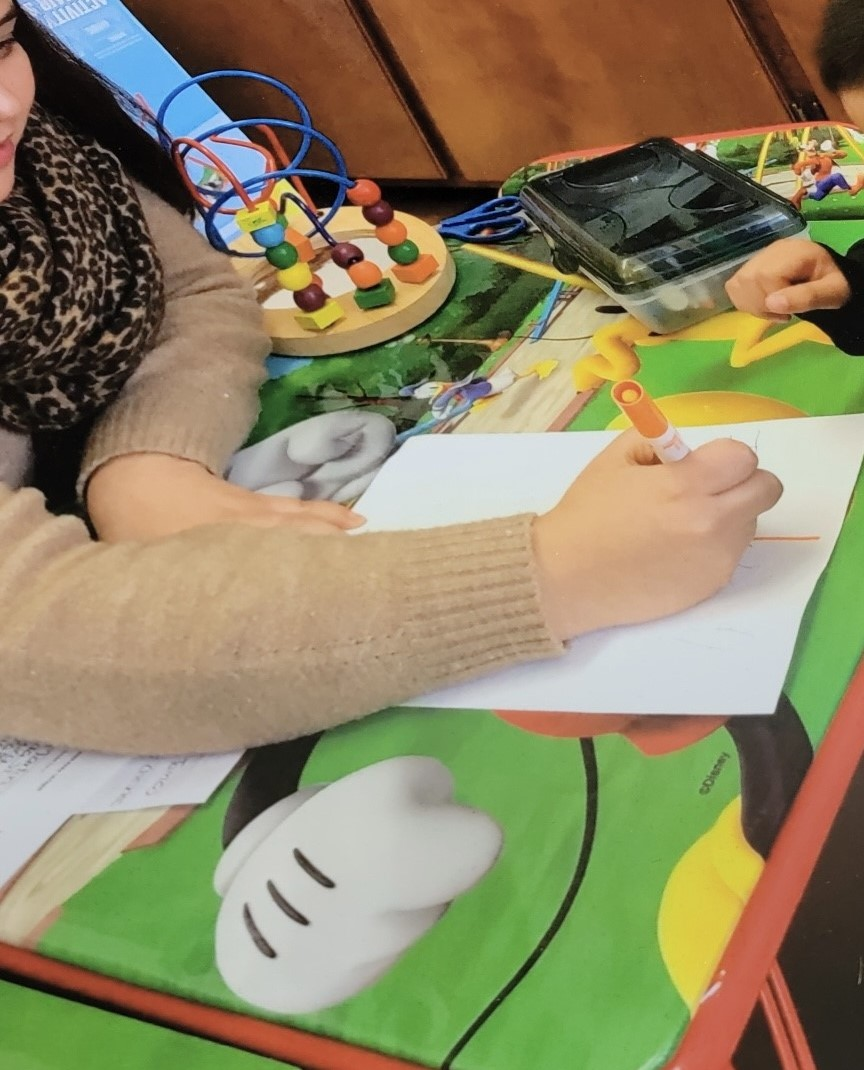
Leonor: Well, this, in this photo I was performing a child development evaluation. This family in particular I remember that the mother didn’t speak Spanish, and the father only a little. They spoke an indigenous language from Guatemala, so, well the barriers are even still more difficult. They even had [language and cultural] barriers with us, no? So, well, you have to educate a family, no? Sometimes they just come to us for a [child] development evaluation, but, particularly in this visit, I remember that we referred the father to glasses, I believe we also referred him to AccessHealth, because he had a health condition. He appeared to be a diabetic. So, many times, like a hook, [families] visit us for a child development evaluation, but, if they aren’t well, it’s harder for the child to learn. It’s more difficult for the entire family to be of good health, no? So, we can’t just focus on the child, although that was the purpose of their visit, we can’t just focus on that, no? We have to help the entire family with their social determinants [of health]. In this case, again, we are not doctors and we cannot diagnose or prescribe. We have limits, but, for example, the father we can educate him, we can tell him where we can more easily access healthy food. In some way as well, he could access programs like AccessHealth, where sometimes they can provide free prescriptions for diabetics through a program called Welvista. We can also encourage them to exercise, which can help improve the father’s health, which if they [exercise] together, can improve the health of the entire family. This could benefit everyone, not so much for the children like the father, but in some way it also, if we go further, could be an important family connection. An emotional support, no? I believe we also have to concentrate, not just on physical health, but also on mental health.
Leonor: Bueno, esta, en esta foto estaba haciendo yo una evaluación de desarrollo infantil. Esta familia particularmente recuerdo que la mamá no hablaba español y el papá un poquito. Ellos hablaban un idioma de Guatemala, entonces, pues, las barreras todavía aún son más, más fuertes. Aún siguen teniendo barreras con nosotros, ¿no? Entonces, pues, es educar a la familia, ¿no? Nada más a veces vienen con nosotros por una evaluación de desarrollo, pero, particularmente en esta visita, recuerdo que el papá nos referimos a lentes, me parece que también lo referimos a AccessHealth, porque el papá tenía una condición de, de salud. Me parece que era diabético. Entonces, muchas veces como el gancho, o asisten por una intervención de desarrollo, pero al final del día sabemos que si los determinantes sociales de la familia, pues, si no están bien, pues es más difícil que el niño aprenda. Es más difícil que la familia tenga una buena salud, ¿no? Entonces, no podemos nada más centrarnos en el niño, aunque nada más, aunque vino realmente como cita a para él, no podemos centrarnos nada más en eso ¿no? Tenemos que apoyar a toda la familia en sus determinantes sociales. En este caso, te vuelvo a repetir, nosotros no somos doctores y no podemos diagnosticar, recetar. Tenemos límites, pero, por ejemplo, con el papá podemos educarlo. Podemos decirle, pues, cómo acceder a comida saludable más fácil, como, de alguna manera, también pueda tener acceso a programas de salud como AccessHealth, donde algunas veces les dan incluso la la medicina gratuita para los diabéticos que en un programa que se llama Welvista. Podemos también incentivarlos a que hacer actividad física, puede ayudar a la a la condición de salud que tiene el papá y que al mismo tiempo esto, si lo realiza en familia, pues. Pues va a ser beneficio para todos, no tanto para los niños como para el papá y de alguna manera también si vamos más profundo, puede ser una conexión familiar importante. Un apoyo emocional, ¿no? Que creo que también tenemos que centrarnos, no nada más en la salud física, sino también en la salud mental.
